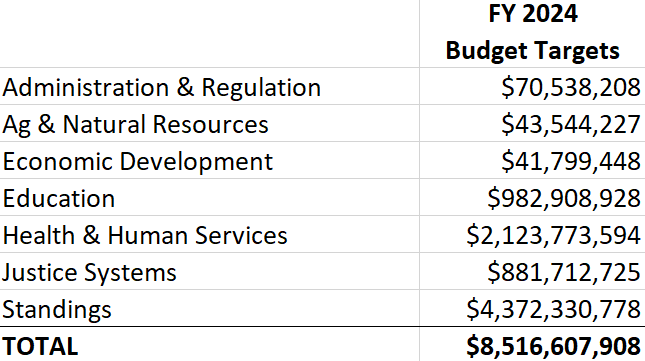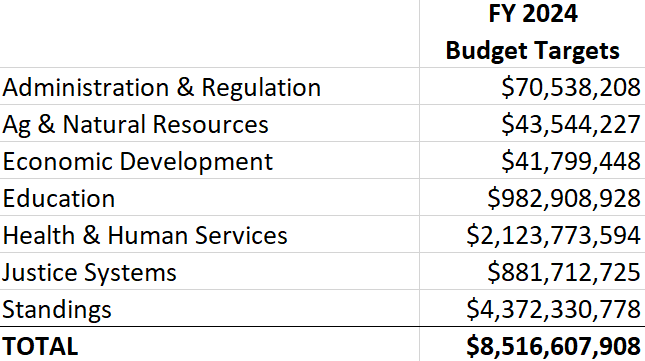The Iowa House and Senate finished work this week on several priority bills for Republicans, and leaders are closer to agreement on the next state budget.
The accelerating pace raises the prospect that the Iowa legislature may adjourn for the year close to the session’s scheduled end date of April 28. Stalemates over policies related to education and COVID-19 vaccines pushed the last two legislative sessions well into overtime; the 2021 session ended on May 19, and last year’s work wrapped up on May 24.
This piece highlights where things stand with high-profile bills approved in either the House or Senate this week, and other legislation that will likely be part of late deal-making. Forthcoming Bleeding Heartland posts will focus on many of those bills separately.
KEY BILLS THAT HAVE RECEIVED FINAL APPROVAL
After holding no floor debate between March 22 and April 17, the Iowa Senate approved dozens of bills this week. The following are the most significant ones headed to Governor Kim Reynolds:
Trucking industry liability protection: Senate Republicans accepted the House amendment to Senate File 228, which caps non-economic damages at $5 million in lawsuits related to commercial vehicle accidents and shields trucking companies’ liability in other ways. Republicans Sandy Salmon, Mark Lofgren, and Cherielynn Westrich joined Democrats to oppose the bill. In early March, GOP senators had approved a bill that was much more favorable to trucking companies, with more liability protection, a cap of $2 million for non-economic damages, and a broader definition of commercial vehicles.
Education policy: In a party-line vote, the Senate passed yet another version of Senate File 496, the governor’s so-called “parental empowerment” bill. Among other things, it would impose new restrictions on school library books, ban instruction on sexual orientation and gender identity from grades K-6, and require school staff to inform parents if students wanted to use different pronouns. The bill would also require written parental consent before students took health surveys and removes the requirement that school districts teach about HIV, HPV, and the vaccine that prevents HPV.
House members accepted the Senate amendment and passed the bill on April 20, with Republicans Michael Bergan, Chad Ingels, Megan Jones, and Hans Wilz joining Democrats to vote no.
Both chambers also approved a separate bill that reduces high school curriculum requirements and would make it easier for people without K-12 teaching licenses to become classroom teachers or school librarians. Senate File 391 cleared the Senate along party lines; one House Republican (Ingels) joined Democrats in opposition.
New restrictions for Iowans on public assistance: On April 13, the House agreed to the Senate’s version of Senate File 494, which imposes a strict asset test for Iowans on federal food assistance and new verification requirements for food benefits, Medicaid, and the Children’s Health Insurance Program. The Senate had approved the bill in a party-line vote; the House vote was 58-41, with no votes coming from all Democrats present and Republicans Jon Dunwell, Brian Lohse, Brent Siegrist, Charley Thomson, and David Young.
Also this week, the Senate finally approved a proposed state constitutional amendment (House Joint Resolution 3) defining the line of succession when a governor leaves office. The House had passed the measure in early February.
The governor doesn’t have the authority to sign or veto proposed constitutional amendments, so that proposal will appear on the 2024 general election ballot, along with a separate amendment clarifying that citizens who are Iowa residents and at least 18 years old have the right to vote.
STATUS OF STATE BUDGET
House and Senate leaders have agreed on fiscal year 2024 spending plans for the seven major areas of the state budget, they announced on April 20. The total spending plan of roughly $8.5 billion is about $30 million more than what Senate Republicans had initially proposed, but about $60 million less than the target House Republicans announced in late March. Here’s how it breaks down:


Republicans have not yet finalized each budget line item. It’s not clear whether they have agreed on spending plans for each state agency that falls within those seven areas.
House members have not yet voted on any appropriations bills for the next fiscal year, which begins on July 1. In early April, the Senate Appropriations Committee advanced seven bills with blank spaces where dollar amounts would normally be. Republicans plan to bring those bills to the Senate floor and move strike-after amendments containing the appropriations agreed to with House leaders.
OTHER POLICY BILLS STILL PENDING
Property taxes: Both chambers approved major property tax reductions this week, by overwhelming bipartisan margins. Leaders have said property tax relief is a high priority for this year. However, Senate File 569 and House File 718 approach the issue in different ways and could not be easily harmonized. If anything sends the 2023 legislative session into extended overtime, it may be this disagreement.
Child labor: Following a marathon overnight debate, the Iowa Senate approved Senate File 542, which relaxes child labor regulations in several ways. The companion bill (House File 647) was on the House debate calendar for April 20, but for reasons that remain unclear, leaders did not bring it to the floor. That could mean House Republicans are working on an amendment, or don’t have the votes to pass the bill. Another possibility: this bill will become a bargaining chip in further negotiations over the budget or property taxes.
State auditor’s powers: The Iowa House approved an amended version of Senate File 478, which would limit the state auditor’s authority in several ways. Auditors would no longer be able to obtain certain information without consent of the entity being audited. The auditor would be unable to go to court to enforce a subpoena against any other state entity. Although the House floor manager claimed the amended bill conforms to government accounting standards and therefore will not risk federal funding, some independent analysts disagree. State Auditor Rob Sand denounced the bill as “the greatest pro-corruption bill in state history and the worst perversion of checks and balances in Iowa history.”
Six Republicans (Mark Cisneros, Matthew Rinker, Jeff Shipley, Ray Sorensen, Luana Stoltenberg, and Charley Thomsen) opposed the bill, as did every Democrat.
Senators are likely to accept the House version, since it doesn’t change the original bill in any meaningful way. The governor’s appointees would be able to prevent Sand’s office from fully investigating possible waste, fraud, and corruption.
Iowa caucus changes: The House has not yet voted on State Representative Bobby Kaufmann’s proposal to require in-person attendance at the Iowa caucuses, and restrict participation to Iowans who were affiliated with a political party at least 70 days before the caucuses. Kaufmann has said House File 716 is needed to protect Iowa’s first-in-the-nation status and prevent New Hampshire officials from moving up the date of their 2024 primary. University of Iowa law professor Derek Muller has argued the bill may be unconstitutional, since Iowa Democratic Party officials are not on board with the proposed restrictions.
Guns: The Senate has not yet voted on House File 654, a “firearms omnibus” bill approved in the lower chamber on April 12. (This bill was still eligible for debate despite the legislature’s “funnel” deadlines because it had been placed on the “unfinished business” calendar.) The measure would allow Iowas to keep loaded firearms in locked vehicles on college campuses and in parking lots outside schools and many other public places. It would also encourage schools to implement a gun safety curriculum developed by the National Rifle Association.
Republicans Gary Mohr and Chad Ingels joined Democrats in opposing final passage of House File 654. I don’t expect any problems for the bill in the Senate; although a large number of entities have lobbied against the proposal, it has the backing of the NRA’s Iowa affiliate, the Iowa Firearms Coalition.

